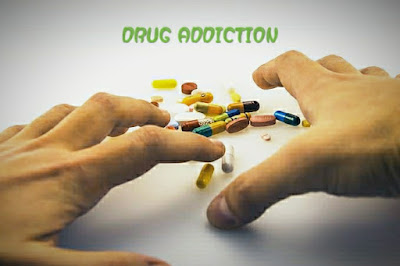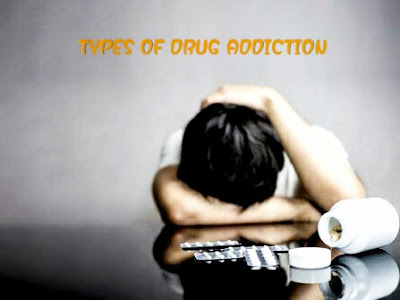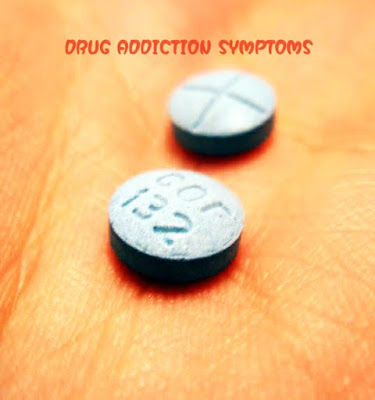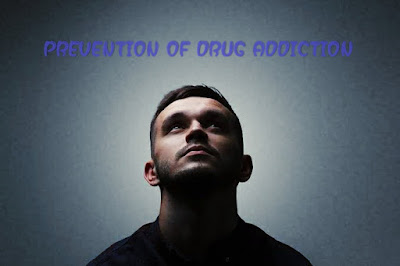DRUG ADDICTION
HELLO FRIENDS,
Today's topic of our discussion is DRUG ADDICTION which is one of the major diseases acquired by today's youth.
About:
Addiction is a disease that can affect a person's brain and behaviour.
Certain substances such as alcohol, marijuana, and nicotine are also considered a form of intoxication, when you become addicted to them, you continue to use them despite knowing the harm caused by them.
Drug addiction can begin with the use of narcotics for the satisfaction of oneself in a social environment.
After which people start using them again and again.
Also, in some people, full opiate addiction to opioids (opioids / a type of drug) starts with being told by someone and consumed on their own.
It is seen that in the initial phase, some friends or relatives recommend to take them.
How fast you become addicted to these drugs depends on their risk, variation of the drugs.
Some medicines such as opioids (painkillers) have a higher risk of addiction and are also the main reason for addiction than others.
As time goes by, you need a higher dose of these narcotics.
Soon you need this to feel better. As you increase usage, you will find it difficult to live without it.
In an attempt to stop the use of narcotics, you feel physically disabled and ill.
You need to seek help from your doctor, family members, friends, support groups, or organized treatment programs to overcome drug addiction and stay drug-free.
TYPES OF DRUG ADDICTION:
Taking nicotine in other forms like cigarettes and tobacco increases addiction.
Consumption of alcohol can damage the brain and many parts of the body.
Marijuana (cannabis) is the most commonly used illicit drug.
Opioids are usually taken for pain relief.
Stimulants such as methylphenidate and amphetamines.
Depressant medications are commonly used for sleep or to reduce anxiety.
Cocaine
Heroin
Ecstasy
DRUG ADDICTION SYMPTOMS:
What are the behaviours and symptoms associated with addiction?
Symptoms or behaviour of addiction can include: -
Even after knowing whether there is physical or psychological harm, continue to commit such intoxication.
Doing things like stealing to get drugs, which you don't usually do.
Driving vehicles and doing such risky tasks even when drunk.
Failing attempts to leave it.
In the event of drug addiction, you can reduce its symptoms.
Consuming the drug for a longer duration than the specified time.
Maintaining the supply of such medicines.
Taking these medicines even if there is not much money.
Stay away from your obligations, work responsibilities and social activities due to addiction.
Willingness to use intoxicants regularly- once or several times throughout the day.
Do not think of anything other than intoxication.
Consuming more drugs to get more effect in a given time.
If your child or a family member has been addicted to addiction, then the following signs are seen in it:
Changes in behaviour, the person does not allow anyone to come to his room and while going with friends, takes care that no one knows about it.
Changes in behaviour with family members and close friends.
Money troubles, sudden requests for money without proper explanation or taking money from home without the knowledge of others.
Health problems such as loss of energy, weight loss or weight gain or red eyes.
Do not show interest in clothing and grooming.
Having problems in school or workplace. Often missing from school or workplace.
Not interested in school and workplace activities for a few days. Also a rapid drop of functionality.
DRUG ADDICTION CAUSES:
What are the causes of addiction
Psychological causes of addiction:
Some psychological causes of drug addiction include trauma. This addiction is seen in youth.
Sexual or physical abuse at home, neglect and the absence of conditions, all these conditions create psychological stress, to avoid which people take some medicines by themselves.
Taking medication by itself causes addiction.
Other psychological causes of addiction include: -
Not being mentally healthy, such as being stressed.
Difficult to connect with others, such as difficult to make friends.
Poor performance in the workplace and school.
Difficult to overcome stress.
Addictive due to the surrounding environment
The environment around the person can also lead to drug addiction.
Where intoxication is acceptable and people take intoxication, there may be signs of intoxication soon in children.
The children grow up and get addicted to it by seeing the elders of drug addicts present in their homes.
Most drug and drug use begins in adolescence, children who suffer from an abusive situation or parental neglect become gradually addicted to the drug.
Reasons responsible for addiction include: -
Participation in a sport where performance-enhancing drugs are used.
A group of friends who use or promote such things.
Low socio-economic status may also be a risk factor for drug addiction.
Genetic causes of addiction
Addiction is passed on from generation to generation in many families, genetic causes can also be the cause of addiction.
It is known that some genes influence the brain to take nicotine and contribute to the cause of addiction.
PREVENTION OF DRUG ADDICTION
How to Stop Addiction
As mentioned earlier, using drugs at an early age can also increase the chances of becoming addicted to drugs.
In the meantime, efforts to curb narcotics and alcohol can go on for a long time.
During any major change in life, the risk of addiction increases.
In adults, drug addiction can also be due to divorce or loss of job.
The use of drugs at a young age impedes our brain function such as memory, learning, decision making and controlling behaviour
When we talk about drug prevention, there are some things in it that can increase your risk, you cannot change them easily.
Which includes the family history of the addict, how you are addicted to alcohol and the state of experiencing trauma.
Although there is no way to stop this addiction that does not fail, yet by following a few things, you can stop yourself from becoming addicted to drugs.
This includes:
To build a strong relationship with your school, religious community or any other organization, it is not necessary that you must consume alcohol in their ceremony.
Participate in programs of anti-drug, tobacco and alcohol related institutions.
Avoid intoxication in youth, people who use alcohol or drugs in their early teens get addicted to it in their later life.
If you have any pain or trauma in your past life, you can seek help by consulting a specialist to come out of it.
Work with a therapist if it is difficult to control yourself.
Choose your friends carefully.
Apart from this, under pressure from colleagues, you can become addicted to drugs at any age, so keep a distance from your friends and close ones.
What to do to get back into position?
A person addicted has to take help of medicines to recover all the functions of his brain again and to overcome its side effects.
Medications are also available for the treatment of opioids (heroin, pain-reducing drugs), tobacco (nicotine), and alcohol addiction.
DIAGNOSIS OF DRUG ADDICTION
How to diagnose addiction?
Diagnosis of addiction requires a thorough evaluation and often involves an evaluation by a psychiatrist or psychologist.
Imaging scans, chest X-rays and blood tests show long-term harmful effects on the entire body.
Blood, urine or other laboratory tests are used to assess drug use, but are not intended to check for intoxication.
However, these tests can be used to monitor treatment and recovery status.
DRUG ADDICTION TREATMENT
How to treat addiction?
There are several ways of successful treatment: -
Detoxification (the process by which toxins are released from the body)
Counseling for drug addiction
Medication (for opioid, tobacco, or alcohol addiction)
Evaluation and treatment for mental health issues such as depression and anxiety
Long-term prevention to prevent recurrence
With the use of medicines, its symptoms and the cause of the condition which can be re-conditioned can be reduced.
What to do to get out of this:
The drug reduces the effects during detoxification in the event of addiction. Detoxification is not a "treatment" in itself, but this process is considered only the first step to recovery.
Patients who do not receive any further treatment after detoxification usually resume their drug use.
Opioids: Methadone and naltrexone are used to treat opioids.
These drugs reduce withdrawal symptoms and relieve side effects.
All these drugs help reduce drug demand and related criminal behavior and help with their behavioral treatment.
Tobacco: There are several forms of nicotine release therapy, including patches, sprays, gum, and lozenges.
For wine
The three approved drugs are as follows:
1. Naltrexone
2. Acamprosate
3. Disulfiram
Concomitant conditions: Other medications are also available to treat mental health conditions such as depression or anxiety, which contribute to relieve a person's addiction.
Behavioral therapies help patients:
Reduce and correct behavior related to drug use.
To enhance the functionalities of health related life.
Continuation of medications with other forms of treatment.
These things help patients:
Identifying, saving and confronting situations in which they may use the most addictive.
Adopt treatment to change their behaviour.
De-addiction centers- While staying at these centers, addicts treat them to quit this habit.
This treatment usually lasts for 6 to 12 months. It focuses on detoxification and counseling.









Gud
ReplyDelete👍🏻
ReplyDeleteMast.
ReplyDeleteVery good😁👍👍
ReplyDeleteAll information useful for us and great job
ReplyDeleteWell done brother
ReplyDeleteUseful content..... Keep it up
ReplyDeleteGreat Job 👍
ReplyDeleteGood work
ReplyDeleteVery informative article
ReplyDeletenice work
ReplyDeleteThis comment has been removed by the author.
ReplyDeleteGood work
ReplyDeleteGreat job
ReplyDelete👍
ReplyDeleteThank you for the update, very nice site.. Cannabis Edibles
ReplyDeleteThank you for the update, very nice site.. Cannabis Edibles Canada
ReplyDelete